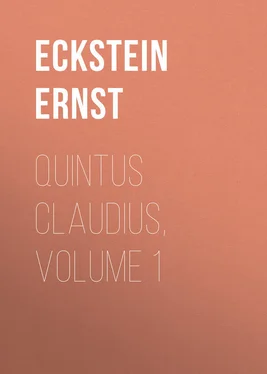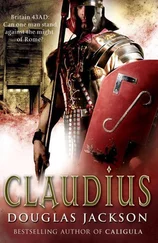Ernst Eckstein - Quintus Claudius, Volume 1
Здесь есть возможность читать онлайн «Ernst Eckstein - Quintus Claudius, Volume 1» — ознакомительный отрывок электронной книги совершенно бесплатно, а после прочтения отрывка купить полную версию. В некоторых случаях можно слушать аудио, скачать через торрент в формате fb2 и присутствует краткое содержание. Жанр: foreign_antique, foreign_prose, на английском языке. Описание произведения, (предисловие) а так же отзывы посетителей доступны на портале библиотеки ЛибКат.
- Название:Quintus Claudius, Volume 1
- Автор:
- Жанр:
- Год:неизвестен
- ISBN:нет данных
- Рейтинг книги:4 / 5. Голосов: 1
-
Избранное:Добавить в избранное
- Отзывы:
-
Ваша оценка:
- 80
- 1
- 2
- 3
- 4
- 5
Quintus Claudius, Volume 1: краткое содержание, описание и аннотация
Предлагаем к чтению аннотацию, описание, краткое содержание или предисловие (зависит от того, что написал сам автор книги «Quintus Claudius, Volume 1»). Если вы не нашли необходимую информацию о книге — напишите в комментариях, мы постараемся отыскать её.
Quintus Claudius, Volume 1 — читать онлайн ознакомительный отрывок
Ниже представлен текст книги, разбитый по страницам. Система сохранения места последней прочитанной страницы, позволяет с удобством читать онлайн бесплатно книгу «Quintus Claudius, Volume 1», без необходимости каждый раз заново искать на чём Вы остановились. Поставьте закладку, и сможете в любой момент перейти на страницу, на которой закончили чтение.
Интервал:
Закладка:
"My lord," 38 38 My Lord Said the Matron. Concerning the address “lord” ( domine ), see the minute discussions in Friedlander’s Sittengeschichte , I, appendix. It was not so common as the modern “sir,” but was used as an expression of special courtesy in the most varied relations of life. The emperors themselves used it in intercourse with persons to whom they wished to show attention. Thus Marcus Antoninus writes to Fronto: “ Have, mi domine magister .” According to Seneca (Ep. III, 1.) it was already customary under Nero to greet persons, whose names could not be instantly remembered, by this title, in order not to appear uncourteous under any circumstances. The Fronto just mentioned calls a son-in-law “ domine ,” and when Nero once played the cithara in public, he addressed the spectators as “ mei domini .” Nay, the association of domine with the name, which to our ears has a very modern sound, is often found. Thus in Appuleius (Met. II,) we read: "Luci domine," – “Lord Lucius.” In this story, however, this association is avoided, as it might have produced the semblance of an anachronism. In accosting women domina (lady) corresponds with domine. The French, when referring to subjects connected with ancient Rome, reproduce the sound as well as the meaning of the word correctly by their madame (meam dominam).
said the matron, with a gravity that was almost solemn, “we can boast of senatorial rank. I am Octavia, the wife of Titus Claudius Mucianus, 39 39 Titus Claudius Mucianus. The Romans usually had three names. Titus is here the first name ( praenomen ) which was given sons on the ninth day after their birth. Claudius is the name of the gens, the family in the wider sense of the word ( nomen gentilicium ). Mucianus is the cognomen, the surname, the name of the immediate family ( stirps or familia ). Thus several stirpes belonged to a single gens. Daughters bore only the name of the gens; for instance the daughter of Titus Claudius Mucianus was called Claudia. If there were two of them, they were distinguished by the words major (the elder) and minor (the younger); if there were several, by numbers. The Claudia Gens was a very ancient and famous one. The principal characters of the story, belonging to the stirps Muciana , are purely imaginary.
the priest of Jupiter, and this is our daughter. We have been staying at Baiae since the end of April for the sake of my health. The sea-air, the aromatic breath of the woods and the delightful quiet of our country-house, which is somewhat secluded, soon restored my strength, and I take a particular pleasure in morning excursions on the bay. We started to-day in lovely weather to sail as far as Prochyta; then the storm overtook us, as you know, at some distance from the shore, and we owe it to you and to your good ship, that we are so well out of the danger. Accept once more our warmest thanks, and pray give us the opportunity of returning in our villa at Baiae the hospitality you have shown us on board your galley.”
“With the greatest pleasure,” said Aurelius eagerly, “and all the more so, as I purposed remaining to rest at Baiae – ” but he colored as he spoke, for this was not the truth – he looked round in some embarrassment at Magus, who was standing humbly in a corner of the room and preparing to serve some refreshment. The eyes of the master and the slave met, and the master colored more deeply, while the slave laughed to himself with a certain satisfaction. Two other servants placed seats round the table in the old Roman fashion, for the custom of lying on a couch at meals was by no means universal in the provinces, and Aurelius knew that even in Rome women of high rank and strict conduct contemned this luxurious habit.
The rocking of the vessel had ceased, for it had been steered into a sheltered cove of the bay, and before long a tempting breakfast was spread on the embroidered cloth; fish, milk, honey, eggs, fruit and a dish of boiled cray-fish, of which the scarlet mail contrasted picturesquely with the artistically-embossed silver-platter on which they were served.
Aurelius begged his guests to be seated and led Octavia to the seat of honor at the upper end of the table. On her left hand her daughter, the fair Claudia, took her seat; Aurelius sat on the other hand and at the side of the table. Herodianus and Baucis, who was still very much discomposed, took their places at the other end of the table and at a respectful distance.
“You must take what little I can offer you, ladies,” said the Batavian. “We Northmen are plain folks…”
“You are joking!” interrupted Octavia. "Do you imagine, that all the inhabitants of the imperial city are gourmands after the fashion of Gavius Apicius?" 40 40 Gavius Apicius, the famous Roman gourmand (Tac. Ann. IV, 1) who finding that he had only two million and a half denari left in the world (about 400,000 dollars) killed himself, thinking it impossible to live on so little.
“Well,” said Aurelius in some confusion, “we know at any rate that Rome is the acknowledged mistress of all the arts of refined enjoyment, and above all of the most extravagant luxury in food…”
“Not half so much so as you believe,” said Octavia. “You gentlemen from the provinces fall, without exception, into that strange mistake. A Roman lady in the same way is to you the type of all that is atrocious, because a few reckless women have made themselves talked about. You forget that it is in the very nature of virtue to remain concealed and ignored. But tell me, my lord, whence do you procure this delicious honey?”
“It comes from Hymettus," 41 41 Hymettus. A mountain in Attica, famed for its delicious honey. (Horace, Od. II, 6, 14).
replied Aurelius, who was somewhat disconcerted by the lady’s airs and manners. “My friend here, the worthy Herodianus, procured it at Panormus.”
“Ah!” said Octavia, raising a polished emerald 42 42 Polished emerald. (Plin. Hist. Nat. XXXVII, 64) where it is stated that the emperor Nero used such an eye-glass at the public games.
mounted in gold to her eye, for she was short-sighted: “Your friend understands the subject, that I must confess – do you not think so, Claudia my love?”
The young lady answered with vague abstraction, for some minutes she had sat lost in thought. She had hardly touched the delicacies that had been set before her, and she now silently waved a refusal to the slave who offered the much-praised honey. Even the vigorous struggle in which Herodianus was engaged with an enormous lobster 43 43 The lobster, ( cammarus ), was less highly esteemed by the Romans than among ourselves. See Plin. Ep. II, 17. "The sea, it is true, has no superabundance of delicious fish; yet it gives us excellent soles and lobsters" – a passage in which lobsters are contrasted with delicious fish.
failed to bring a smile to her lips, and yet her expression had never been brighter or more radiant. Once and again her eyes rested on the face of the young Batavian, who was engaged in such eager conversation with her mother, and then they returned to the loop-hole in the cabin roof, where the pane of crystal 44 44 Cut Crystal. Window panes of glass ( vitrum ) mica plates ( lapis specularis ) and similar materials were by no means rare in ancient times.
shone like a diamond in the sunshine.
Octavia was talking of Rome, while Herodianus entertained Baucis with an account of Menander’s 45 45 Menander, son of the general Diopeithes, B.C. 342. The most distinguished poet of the New Comedy; fragments of his comedies have come down to us.
comedies; thus Claudia could pursue her day-dream at her pleasure. She was in fancy again living through the events of the last hour – she pictured herself in the small open boat tossed on the angry waves; far away across the seething waters she saw the tall trireme – saw it tack to enter the bay. It was all vividly before her. And then the moment when the slave flung the rescuing rope! who was the man who stood, calm and proud, leaning over the bulwarks, undisturbed by the wrath of Nature? She remembered exactly how he had looked – how at the sight of that noble figure, which seemed as though it could rule the storm, a sudden sense of safety had come over her, like a magical spell. Then, when she found herself on board! At first she had felt ready to sob and cry like Baucis; but the sound of his voice, the wonderful look of gentle strength that shone in his face, controlled her to composure. Only once in her life had she ever felt like this before; it was two or three years since, when she was out on an excursion to Tibur 46 46 Tibur. A favorite summer resort of the Roman aristocracy, now Tivoli.
with her illustrious father. Their Cappadocian horses 47 47 Cappadocian horses. The province of Cappadocia in Asia Minor was famed for its horses.
had shied, reared, and then galloped off like the whirlwind. The driver was flung from his seat – the chariot was being torn along close to the edge of a towering cliff – her father had seized the floating reins just in time, and quietly saying: “Do not be frightened, my child,” in five seconds the horses were standing still as if rooted to the spot. The feeling she had had then, had to-day been vividly revived – and yet, how dissimilar were the two men in age, appearance and position! – It was strange. And once more she glanced at the face of their host, which was glowing with animation as he talked.
Интервал:
Закладка:
Похожие книги на «Quintus Claudius, Volume 1»
Представляем Вашему вниманию похожие книги на «Quintus Claudius, Volume 1» списком для выбора. Мы отобрали схожую по названию и смыслу литературу в надежде предоставить читателям больше вариантов отыскать новые, интересные, ещё непрочитанные произведения.
Обсуждение, отзывы о книге «Quintus Claudius, Volume 1» и просто собственные мнения читателей. Оставьте ваши комментарии, напишите, что Вы думаете о произведении, его смысле или главных героях. Укажите что конкретно понравилось, а что нет, и почему Вы так считаете.












